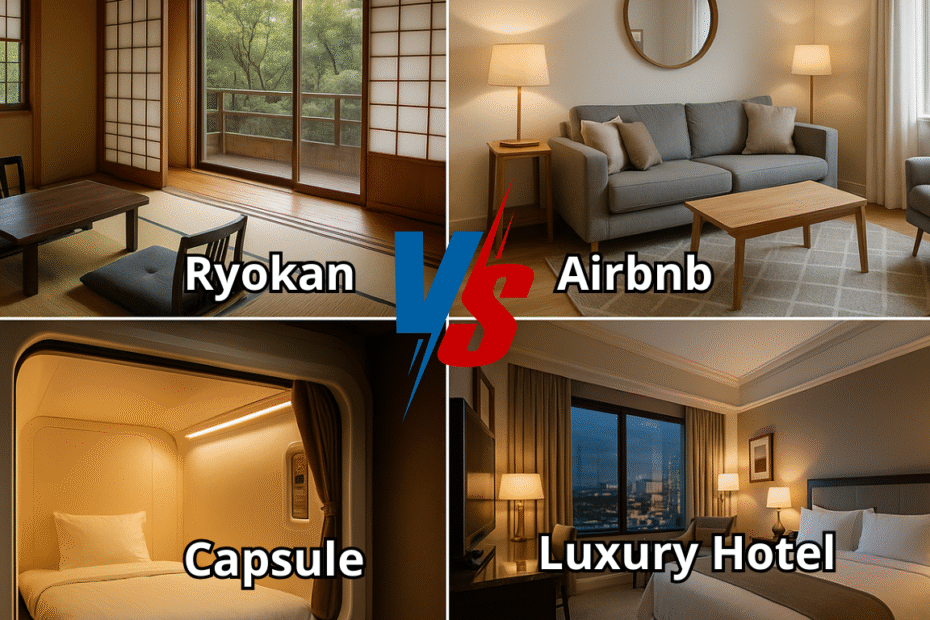Introduction: Why This Choice Matters
Japan in 2025 is experiencing one of the busiest tourism booms in its history. In 2024, Japan welcomed 37.47 million international tourists, surpassing the previous record of 31.9 million in 2019. The government has set an ambitious target: 60 million by 2030. For travelers, this means higher demand, more competition for accommodations, and rising prices in peak seasons.
Choosing between a hotel and an Airbnb is no longer just about saving money. It affects your comfort, your cultural immersion, and even how much sightseeing time you’ll actually enjoy.
Hotels vs Airbnb: First Impressions
At first glance, hotels in Japan offer reliability: front desks open 24/7, daily cleaning, baggage storage, and a predictable level of service. On the other hand, Airbnb rentals promise more space, kitchens, and a chance to “live like a local.” But there’s a catch: strict regulations, cleaning fees, and service charges often blur the real cost advantage.
Comparison Snapshot — Hotels vs Airbnb (Japan 2025)
- Availability: Hotels open year-round; Airbnb capped at 180 days/year.
- Services: Hotels = 24/7 reception, cleaning, luggage storage. Airbnb = self check-in, cleaning only before stay.
- Space: Hotels compact; Airbnb offers kitchens and laundry.
- Cost structure: Hotels = rate + service + VAT + city tax. Airbnb = rate + cleaning + service + VAT + city tax.
- Best for: Hotels → short stays; Airbnb → families, long stays, groups.
The True Cost of Staying in Japan
Many travelers look at the advertised nightly rate and assume Airbnb is cheaper. But Japan’s fee structures make things more complicated. Let’s look at three realistic scenarios.
For a short two-night stay in Tokyo, Airbnb may seem affordable at first glance. Yet once you add a flat cleaning fee and service charges, the total bill often ends up higher than a mid-range business hotel.
Cost Reality — 2 Nights in Tokyo (Solo/Couple)
Airbnb
- Nightly: ¥8,000 × 2 = ¥16,000
- Cleaning fee: ¥10,000
- Service fee (~14%): ¥3,640
- Total ≈ ¥29,640 (≈ ¥14,820/night)
Hotel
- Nightly: ¥10,000 × 2 = ¥20,000
- Service charge (10%): ¥2,000
- VAT (10%): ¥2,200
- City tax: ¥200
- Total ≈ ¥24,400 (≈ ¥12,200/night)
➝ Hotels are usually cheaper for short stays once fees are added.
Now imagine a family of four spending a week in Osaka. This is where Airbnb shines: renting an entire apartment or house is not only cheaper than booking two hotel rooms, but also far more comfortable. Families benefit from kitchens and laundry, reducing food and extra costs.
Cost Reality — 7 Nights in Osaka (Family of 4)
Airbnb
- Nightly: ¥20,000 × 7 = ¥140,000
- Cleaning fee: ¥12,000
- Service fee (~14%): ¥21,280
- Total ≈ ¥173,280 (≈ ¥6,200 pp/night)
Hotel (2 rooms)
- Nightly: ¥12,000 × 2 × 7 = ¥168,000
- Service charge (10%): ¥16,800
- VAT (10%): ¥18,480
- City tax: ¥5,600
- Total ≈ ¥208,880 (≈ ¥7,460 pp/night)
➝ Families and groups save money and gain space with Airbnb.
Finally, consider the case of a digital nomad staying a full month in Tokyo. Here, Airbnb or serviced apartments almost always beat hotels. The longer the stay, the smaller the impact of one-time cleaning fees, and the benefits of a kitchen and private laundry become priceless.
Cost Reality — 30 Nights in Tokyo (Digital Nomad)
- Airbnb: ¥324,900 (≈ ¥10,830/night)
- Hotel: ¥369,000 (≈ ¥12,300/night)
➝ Long stays favor Airbnb or serviced apartments.
Understanding the Minpaku Law (Airbnb in Japan)
One reason Airbnb feels different in Japan is the country’s strict regulation of short-term rentals, known as the Minpaku Law. Since 2018, all hosts must register their property, display a license number, and operate under strict limits.
- The most important rule: Airbnb rentals are capped at 180 days per year. This means supply is limited, especially in central Tokyo and Kyoto.
- Municipalities like Kyoto and Shinjuku in Tokyo add further restrictions, sometimes banning weekday rentals or limiting properties to certain districts.
For travelers, the key is to always check that a listing shows its license number. If it doesn’t, there’s a risk of last-minute cancellations.
Minpaku (Airbnb Rules) — Quick Checklist
- 180-day annual limit per property.
- License number must be shown in listing.
- Kyoto/Tokyo districts may add stricter rules.
- Safe booking = check license + reviews + ask host.
Local Accommodation Taxes in 2025
Beyond nightly rates and service fees, travelers must also factor in city accommodation taxes. These are modest for budget stays but can be significant for luxury bookings.
- In Tokyo, you pay nothing under ¥10,000 per night, but between ¥10,000–14,999 it’s ¥100, and ¥200 for ¥15,000 or more.
- In Osaka, new rules in September 2025 lower the threshold and raise mid-tier taxes to ¥200–¥400 per night.
- In Kyoto, starting in 2026, luxury stays over ¥100,000 could face a massive ¥10,000 tax per person per night.
City Accommodation Taxes (2025)
- Tokyo: ¥0 (<10k), ¥100 (10k–14,999), ¥200 (15k+)
- Osaka: Mid tiers ¥200–¥400 (from Sep 2025)
- Kyoto: Luxury ≥¥100,000 → ¥10,000 tax pp/night (from 2026)
Logistics: What Really Changes Your Trip
A key difference between hotels and Airbnb is not just money — it’s logistics.
Hotels in Japan usually check guests in from 15:00–16:00 and check them out by 10:00–11:00. Crucially, they will almost always store your luggage for free before check-in and after check-out, allowing you to explore unburdened.
Airbnb properties, in contrast, rely on self check-in via lockboxes or keypads. If instructions fail, there’s no reception to help. And unless the host explicitly offers storage, you’ll need to rely on coin lockers at train stations — which cost ¥300–¥800/day and can be full during peak seasons.
Vrbo — Private Homes & Apartments in Japan
For travelers comparing Airbnb and hotels, Vrbo offers fully equipped homes and apartments across Japan. It’s perfect for families, groups, or anyone who wants more space and privacy than a standard hotel room or ryokan.
Affiliate Disclosure: If you book accommodation through this link, DiscoverJapanSites.com may earn a small commission at no extra cost to you. This helps us keep providing free and reliable travel guides.
Ryokan: The Heart of Japanese Hospitality
For those seeking the ultimate Japanese cultural experience, nothing compares to staying in a Ryokan. These traditional inns, often located in scenic towns or near hot springs, immerse guests in centuries-old hospitality.
You will sleep on futons laid over tatami mats, wear a yukata robe, and enjoy a kaiseki multi-course dinner—an elaborate culinary journey of seasonal Japanese dishes. Meals are served either in your room or in a dedicated dining hall (shokudō) with attentive, personalized service.
The experience is rounded off by soaking in an onsen bath, surrounded by nature or traditional architecture. Though ryokans are pricier than standard hotels, they provide an unmatched combination of comfort, gastronomy, and cultural depth.
Check-In and Check-Out in Japan: What Happens to Your Luggage?
One of the most overlooked details of traveling in Japan is how check-in and check-out times affect your day. Hotels and ryokan usually allow check-in from 15:00–16:00 and require check-out by 10:00–11:00. At first glance, this seems like wasted time, but there is a hidden advantage: most hotels and ryokan will store your luggage for free before you check in and after you check out. This allows you to explore the city without dragging heavy bags until your room is ready or until it’s time to leave for your train or flight.
Airbnb, however, works very differently. Since there is no front desk and most properties rely on self check-in (keypads or lockboxes), there is usually no option to leave your bags after check-out. If your flight or Shinkansen leaves in the evening, this creates a gap of several hours where you must carry your luggage.
This is where coin lockers (コインロッカー, koin rokkā) and luggage delivery services become essential. Almost every major station in Japan is equipped with coin lockers where you can store bags for the day, and for longer distances, takkyubin (宅急便) services can transfer your suitcase directly to your next hotel. Both solutions fill the gap that Airbnb cannot provide, ensuring your trip remains stress-free.
In short:
- Hotels/Ryokan: Free storage, hassle-free.
- Airbnb: No guaranteed storage — travelers must plan alternatives.
- Lockers and Takkyubin: Practical backups that make a huge difference for mobility.
Check-In / Check-Out — Japan Norms
- Hotels: 15:00–16:00 check-in; 10:00–11:00 check-out; free luggage storage.
- Airbnb: Self check-in (lockbox/keypad); no reception.
- Coin lockers: ¥300–¥800/day, often full in peak season.
Why Airbnb Is Different
Airbnb works very differently because most hosts are private individuals and there is no front desk.
- Hosts are not required to store luggage before check-in or after check-out.
- Cleaning schedules between guests often make it impossible to keep bags.
- Even when a host agrees, it is usually a personal favor, not a guaranteed service.
Airbnb hosts are private individuals and are not required to keep your luggage. Always confirm in advance, but plan alternatives in case storage is not possible.
Example:
A visitor in Kyoto checks out of an Airbnb at 10:00 am, but their Shinkansen leaves at 6:00 pm. The host cannot store luggage, so the traveler must find another solution.
Practical Solutions for Airbnb Guests
- Confirm early: Always ask your host in advance if baggage storage is possible, but never rely on it.
- Coin lockers: Use lockers in train stations for same-day storage until departure.
- Takkyubin delivery: Send your luggage directly to your next hotel or airport and travel light.
Example:
A couple leaves their Osaka Airbnb in the morning, sends their large suitcases by Takkyubin to Tokyo, and spends the day sightseeing with only backpacks. They pick up their luggage two days later at the hotel in Tokyo.
Takkyubin Guide
Takkyubin (Luggage Delivery Service in Japan)
One of the smartest logistics tools in Japan is Takkyubin (宅急便), the door-to-door luggage delivery service operated mainly by Yamato Transport (the company with the black cat logo).
It allows you to send your suitcase from one hotel to another—or even to the airport—so you don’t need to carry heavy luggage on trains, buses, or through crowded stations. It is punctual, reliable, and reasonably priced for the comfort it provides.
How it works
Strategic advantage: you can travel for 1–2 days with just a backpack, then meet your suitcase at your next hotel. This makes side trips to Hakone, Fuji Five Lakes, or the Japanese Alps much easier.
Where to arrange it: at the front desk of almost any hotel, at convenience stores (7-Eleven, FamilyMart, Lawson), or at Yamato counters in airports.
What you need: the next hotel’s name, full address, postal code, and the booking name.
Delivery speed: usually next day; if sent early in the morning and nearby, same-day delivery is sometimes possible.
Tripadvisor — Hotels, Ryokan & Guesthouses in Japan
Tripadvisor lets you compare hotels, ryokan, and guesthouses across Japan with real traveler reviews. Whether you want a modern hotel in Tokyo, a traditional ryokan with hot springs, or a budget guesthouse, you can find verified options with ease.
Affiliate Disclosure: If you book accommodation through this link, DiscoverJapanSites.com may earn a small commission at no extra cost to you. This helps us keep providing free and reliable travel guides.
Takkyubin Reference Prices (2025)
| Size (L+W+H) | Max Weight | Tokyo → Kyoto/Osaka | Tokyo → Hokkaido/Kyushu | Delivery Time |
|---|---|---|---|---|
| Up to 100 cm | ~10 kg | ¥1,600–¥1,900 | ¥2,200–¥2,600 | Next day (1–2 days if distant) |
| Up to 120 cm | ~15 kg | ¥1,700–¥2,000 | ¥2,400–¥2,800 | Next day (1–2 days if distant) |
| Up to 140 cm | ~20 kg | ¥2,000–¥2,300 | ¥2,800–¥3,200 | Next day (1–2 days if distant) |
| Up to 160 cm | ~25 kg | ¥2,200–¥2,500 | ¥3,000–¥3,400 | Next day (1–2 days if distant) |
Notes: Prices are indicative (Yamato, 2025). Fees are based on size (L+W+H) or weight, whichever is larger. Extra charges may apply for airport delivery, same-day service, or insurance.
Coin Lockers in Japan: How They Work and What to Expect
For short-term storage, coin lockers (コインロッカー, koin rokkā) are one of the most practical tools available to travelers in Japan. They are everywhere: inside major train stations, near subway exits, in shopping malls, and even at some tourist sites.
How they work
- Traditional key lockers: You choose an empty locker, place your luggage inside, insert the fee in ¥100 coins, and turn the key to lock it.
- Modern electronic lockers: Controlled by a touch screen. You select a locker, put your luggage inside, and pay either with coins, bills, or—more conveniently—an IC card like Suica or Pasmo. The system then issues a code or links the locker to your IC card, which becomes your “key.”
Sizes and luggage fit
Extra Large (XL): Designed for oversized or multiple pieces of luggage, though these are fewer in number and fill up quickly.
Small (S): Perfect for a backpack or shopping bags.
Medium (M): Fits most carry-on suitcases or cabin bags.
Large (L): Can hold a standard checked suitcase.
Important: The fee is calculated by calendar day, not 24 hours. Example: if you store a bag at 10:00 pm and pick it up at 8:00 am the next day, you’ll be charged for two days because it crossed midnight.
Where to find them
- Tokyo: Almost every JR Yamanote Line station (Shinjuku, Shibuya, Tokyo Station) has hundreds of lockers.
- Kyoto & Osaka: Main stations (Kyoto Station, Osaka Umeda, Shin-Osaka) also have entire locker halls.
- Smaller cities: Fewer lockers, but usually at least one row inside the main station.
- Tourist sites: Some temples and attractions like Asakusa, Nara Park, or Fuji Five Lakes areas have lockers near the entrance.
Strategic use
- Perfect for same-day sightseeing: If you check out of an Airbnb at 10:00 am but your train is at 6:00 pm, store your suitcase in a locker and explore the city hands-free.
- Combine with Takkyubin: Use a locker for just one day, then send larger bags ahead with Yamato. This way, you’re never stuck carrying everything at once.
Coin Lockers — Sizes & Prices (Reference 2025)
| Locker Size | Dimensions (H × W × D) | Typical Price / Day | Fits Best |
|---|---|---|---|
| Small (S) | ~34 × 35 × 57 cm | ¥300–¥400 | Backpack, shopping bags |
| Medium (M) | ~55 × 35 × 57 cm | ¥400–¥600 | Carry-on suitcase, cabin bag |
| Large (L) | ~84 × 35 × 57 cm | ¥600–¥800 | Standard suitcase |
| Extra Large (XL) | ~115 × 35 × 57 cm | ¥900–¥1,200 | Very large suitcase / 2 small bags |
Note: Fee is by calendar day (resets at midnight), not 24 hours. Peak stations (Shinjuku, Tokyo Station, Kyoto) fill fast—have a Plan B (manned storage or apps like ecbo cloak).
Final Takeaway
The “best” choice depends heavily on who you are and how you plan to travel:
- First-time visitor (solo or couple, under 10 days): Business hotels like APA, Toyoko Inn, or Dormy Inn are the safest bet.
- Backpacker: Capsule hotels (¥2,500–¥4,500) or hostels (¥3,000–¥6,000) are unbeatable for budget and location.
- Family or group (4+ people): Licensed Airbnbs or aparthotels combine value with comfort.
- Digital nomad (30+ days): Serviced apartments or long-stay Airbnbs offer the best balance of cost and independence.
- Luxury traveler: Ryokan and 4–5★ hotels provide cultural immersion with onsen baths and kaiseki meals
Whatever you choose, book early, check license numbers, read recent reviews, and always plan around luggage and transport. In Japan, these small details will shape your trip as much as your budget.





